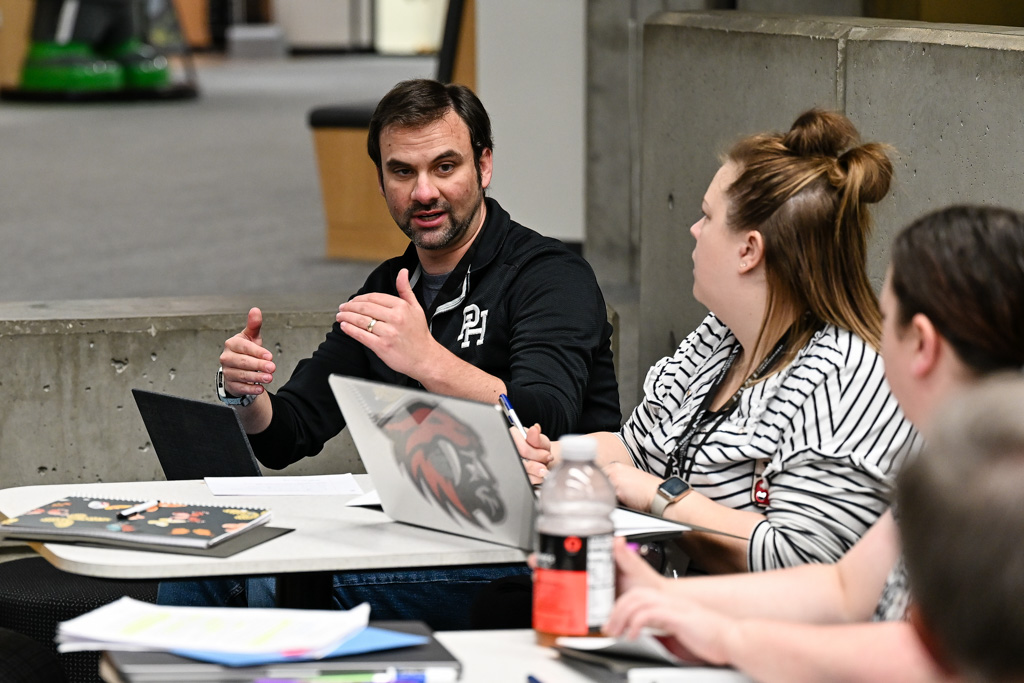

Fall Civic Educators Conference 2024
See photos of the event here.
Watch video of the sessions here.
The Center for Constitutional Studies (CCS) held its fall civics-educator conference Nov. 12, 2024, in UVU’s Sorensen Center. The theme of the conference was Teaching the Declaration at 250: Founding Principles of Natural Rights and Civic Virtue.
Secondary-education civic educators (public traditional, public charter, private, and homeschool teachers) attended for a day of instruction by top civics scholars, curriculum development workshops, and primary-source discussions. Teachers who attended the conference received reimbursement for substitute teachers, mileage for long-distance travel, 0.5 USBE (MIDAS) credit, digital and/or hard copies of presentation materials, lesson-plans, and resources for classroom activities.
As he opened the conference, Dr. Robert Burton, director of the Civic Thought & Leadership Initiative (CTLI), which organizes the conference, thanked the teachers and administrators assembled.
“We just love working with you,” he said. “We love to learn from you and with you. Our purpose at CTLI is to partner with you and others in developing the next generation of citizens and civic leaders with the knowledge, skills, dispositions, and virtues necessary for a just, free, and flourishing republic.”
“This is the start of a two-year celebration and study of the Declaration of Independence,” he added. “There is nothing we could better focus our time on than the Declaration, which captures those important concepts and principles.”
In the morning sessions, attended by about 150 teachers, administrators, and staffers, Carol McNamara and Kirstin Birkhaug, spoke on natural rights and civic virtue, respectively.
“We owe a great deal to Thomas Jefferson for the shape and form of the Declaration, but it was not his intention to be original,” McNamara explained, as Jefferson himself wrote in response to his critics that he borrowed heavily from others: “’The object of the Declaration of Independence was not to find out new principles or new arguments never before thought of, not merely to say things which had never been said before, but to place before mankind the common sense of the subject. Neither aiming at originality of principle or sentiment, nor yet copied from any particular and previous writing, it was intended to be an expression of the American mind.’”
As for the justification for breaking ties with Britain, “Jefferson’s fundamental point here is that the Americans deny that the king of England has any divine right, meaning a power given to him by God to rule over the American colonies in perpetuity,” she continued. “Instead, their argument is that every individual and group of human beings who forms a political society has a natural right to withdraw consent to be governed by any particular community and that there is a different natural and universal—not divine—standard that in fact governs nations. That standard is the laws of nature and nature’s God. Under this natural and rational standard, the Americans had this natural right to withdraw and then redirect their political consent to establish and new political society.”
Regarding civic virtue, in her remarks Birkhaug observed that in general, “a vanishing few” men of the Founding left behind a clear or consistent ethic for understanding what that was for the American citizen. Instead, she suggested, “the Madisons, the Hamiltons, the Jeffersons, and the Franklins” of our history primarily viewed the founding as a process.
In contrast, Birkhaug argued, “The women of the Founding did not possess voting rights; their primary modes of participation in politics came by way of civic engagement and participation. Many of the women who wrote about American politics put a premium not on legal rights and institutions but on the social and interpersonal dimensions of politics and citizenship.”
Birkhaug held up Mercy Otis Warren, a well-known playwright, poet, and satirist of the time, as the woman “who best articulated how American Politics would shape the American people and how the founding documents might produce civic virtue,” citing Warren’s 1788 essay, “Observations on the New Constitution,” and her two-volume History of the American Revolution, published in 1805, as examples that “it was the women of the Founding who best articulated how American politics would shape the American people and how the founding documents might produce civic virtue.”
In his afternoon keynote address, Jeffrey Rosen, CEO of the National Constitution Center, spoke on the meaning of “the pursuit of happiness,” which Thomas Jefferson included in the opening lines of the Declaration of Independence. He offered examples from both Jefferson and Benjamin Franklin how virtue played an important role in their personal pursuit of happiness.
Rosen discovered that both Founders chose their personal mottos from a book, The Tusculan Disputations, by Roman philosopher Cicero. Franklin chose this quote from that book, “Without virtue, happiness cannot be,” as the basis for his 13-virtue system for achieving moral perfection, which Franklin elaborated in his autobiography.
In Jefferson’s case, he drafted a list of 12 virtues for his daughters—very similar to Franklin’s—which he encouraged them to live by. Rosen explained that when Jefferson was asked in his later years for his secret to happiness, Jefferson offered a line from Cicero’s Disputations: “He who’s achieved tranquility of soul, who’s neither unduly exuberant or unduly despondent, he is the self-composed man of whom we are in quest. He is the happy man.”
From these examples, Rosen suggested to the audience that “doing good” and not “feeling good” was the key to pursuing and finding happiness in one's personal and civic life.
- 8 a.m. | SC 101 | Check-in
- 8:30 a.m. | SC 101 | Welcome & Introduction
- 8:45 a.m. | SC 101 | Session 1 – Natural Rights | Dr. Carol McNamara, Great Hearts Institute
- 10:05 a.m. | Break
- 10:15 a.m. | Session 2 – Civic Virtue | Dr. Kirstin Birkhaug, Hope College
- 11:45 a.m. | Grande Ballroom | Lunch
- 12:05 p.m. | Keynote | Dr. Jeffrey Rosen, National Constitution Center
- 1:30 p.m. | Discussion – Primary Sources
- 2:30 p.m. | Lesson Planning
- 3:15 | Adjourn

